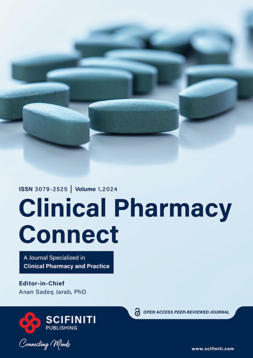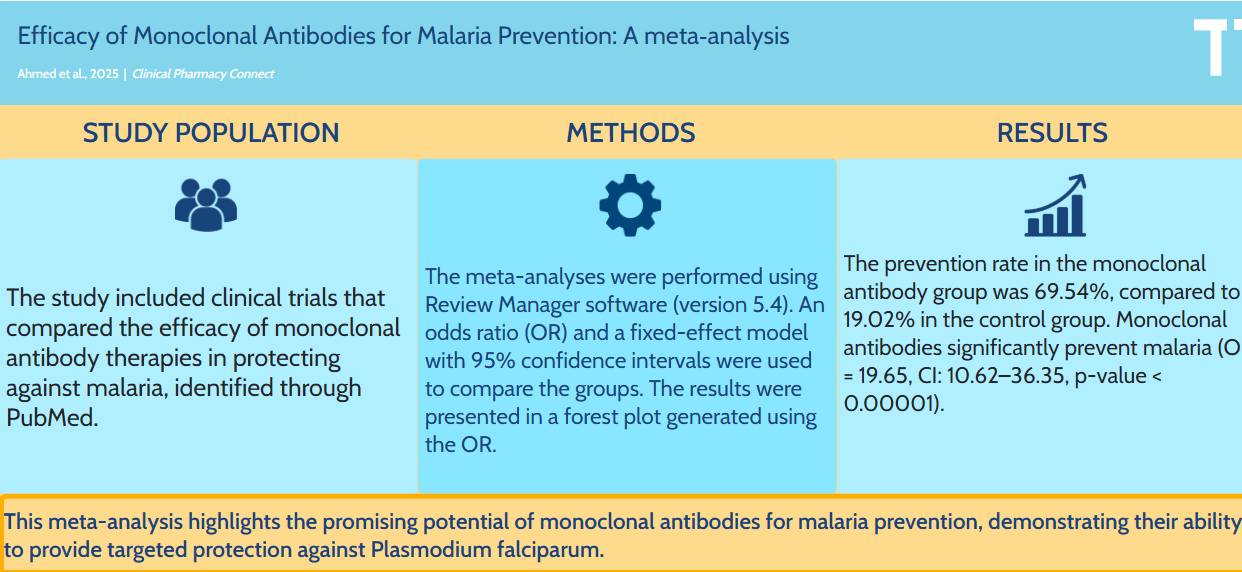
APA Style
Nehad Jaser Ahmed. (2025). Efficacy of Monoclonal Antibodies for Malaria Prevention: A meta-analysis. Clinical Pharmacy Connect, 1 (Article ID: 0006). https://doi.org/Registering DOIMLA Style
Nehad Jaser Ahmed. "Efficacy of Monoclonal Antibodies for Malaria Prevention: A meta-analysis". Clinical Pharmacy Connect, vol. 1, 2025, Article ID: 0006, https://doi.org/Registering DOI.Chicago Style
Nehad Jaser Ahmed. 2025. "Efficacy of Monoclonal Antibodies for Malaria Prevention: A meta-analysis." Clinical Pharmacy Connect 1 (2025): 0006. https://doi.org/Registering DOI.
 ACCESS
Systematic Review
ACCESS
Systematic Review
Volume 1, Article ID: 2025.0006

Nehad Jaser Ahmed
n.ahmed@psau.edu.sa
Department of Clinical Pharmacy, College of Pharmacy, Prince Sattam Bin Abdulaziz University, Alkharj 16278, Saudi Arabia
Received: 26 Jul 2025 Accepted: 14 Nov 2025 Available Online: 16 Nov 2025
Malaria is a mosquito-borne illness caused by Plasmodium parasites. Annually, there are an estimated 200 to 400 million malaria cases, leading to more than 500,000 deaths. Monoclonal antibodies are a unique strategy to offer long-term passive protection against malaria. This meta-analysis seeks to evaluate the effectiveness of monoclonal antibody therapies in offering protection against malaria. The study included clinical trials that compared the efficacy of monoclonal antibody therapies in protecting against malaria, identified through PubMed. An odds ratio (OR) and a fixed-effect model with 95% confidence intervals were used to compare the groups. The results were presented in a forest plot generated using the OR. The meta-analyses were performed using Review Manager software (version 5.4). The prevention rate in the monoclonal antibody group was 69.54%, compared to 19.02% in the control group. Monoclonal antibodies significantly prevent malaria (OR = 19.65, CI: 10.62–36.35, p-value < 0.00001). This meta-analysis highlights the promising potential of monoclonal antibodies for malaria prevention, demonstrating their ability to provide targeted protection against Plasmodium falciparum. While monoclonal antibodies show significant efficacy, variability across populations and challenges in cost and scalability call for further research.

Disclaimer : This is not the final version of the article. Changes may occur when the manuscript is published in its final format.
We use cookies to improve your experience on our site. By continuing to use our site, you accept our use of cookies. Learn more